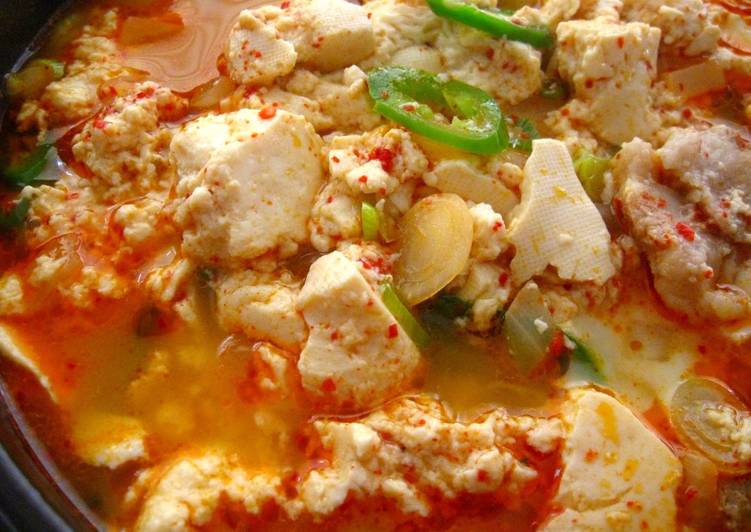Soondubu Jjigae (Korean Soft Tofu Stew) for 2. This warming and comforting jjigae (Korean stew) is made with extra soft tofu (soondubu), thinly sliced meat, kimchi and anchovy broth. Today I want to share a popular Korean stew - Sundubu Jjigae (순두부 찌개, Korean spicy soft tofu stew). With a rich, flavorful, spicyhot broth and the delicious complement of lots of light, healthful, and nutty tasting soft tofu, soondubu jjigae (pronounced SOONdooboo TCHIgeh), literally "soft tofu stew," is becoming an increasingly.
 I befriended a woman who worked there and she gave me the recipe.
Sundubu Jjigae or Soft Tofu Stew recipe that is so easy to make and so delicious that my husband told me it's almost as good, if not better than the ones at the restaurant!
I would have never imagined that Sundubu Jjigae would become so popular with non-Koreans.
You can have Soondubu Jjigae (Korean Soft Tofu Stew) for 2 using 12 ingredients and 6 steps. Here is how you cook that.
I befriended a woman who worked there and she gave me the recipe.
Sundubu Jjigae or Soft Tofu Stew recipe that is so easy to make and so delicious that my husband told me it's almost as good, if not better than the ones at the restaurant!
I would have never imagined that Sundubu Jjigae would become so popular with non-Koreans.
You can have Soondubu Jjigae (Korean Soft Tofu Stew) for 2 using 12 ingredients and 6 steps. Here is how you cook that.
Ingredients of Soondubu Jjigae (Korean Soft Tofu Stew) for 2
- You need 1/2 of a small onion, chopped.
- Prepare 2 cloves of garlic, minced.
- You need 2 teaspoons of gochugaru (Korean chili flakes) or 1 teaspoon crushed red chili flakes to start.
- You need 1/2 teaspoon of sugar.
- It's 1/4 pound of pork belly or shoulder, cut into small strips (about 1.5 inch x.5 inch).
- You need 2 cups of unsalted stock (chicken, pork, beef or seafood are all fine) or water if you don't have stock.
- You need 1 Tablespoon of fish sauce.
- Prepare 1 pound of soft tofu.
- Prepare 1-2 of eggs.
- You need 1 of small green onion, chopped.
- Prepare of optional: 1 chopped fresh chili.
- You need of optional: 1 teaspoon saewoo jut (Korean brined microshrimp).
I always thought that it was unfortunate how Tofu got such a bad wrap for being a healthy but bad tasting food. The Korean stew (jjigae, 찌개) made with sundubu (or soondubu, 순두부) is enormously popular both in and outside Korea. We chose to make it lighter and simple and only put some kimchi, enoki mushrooms, and eggs. But other soondubu jjigae that we ate in restaurants can have mussels, squids, pork, and other kinds of proteins or vegetables.
Soondubu Jjigae (Korean Soft Tofu Stew) for 2 step by step
- Put all ingredients except soft tofu, egg and green onion in a pot and bring to vigorous boil over medium high heat. Continue to let it boil for another 3 to 4 minutes..
- Loosely crumble the tofu and distribute evenly over boiling stew mixture, cover partially, and continue to boil over medium high heat for another 3 or 4 minutes..
- Gently stir to incorporate all ingredients and adjust seasoning if needed. At this point, you can just add kosher salt for added salt element. You may want to ratchet up the heat with more chili flakes, too..
- Bring the stew up to a vigorous boil again for 2 or 3 minutes..
- Remove from heat, crack raw egg(s) into center, sprinkle green onions top, and serve with steamed rice on the side. Don't forget to spoon some of the boiling hot stew broth (enough to cover) over the top of the raw egg and leave it undisturbed for 3 to 4 minutes to cook the whites through..
- Enjoy with a bowl of steamed rice and kimchi, too, if you've got it! :) My kimchi recipe: https://cookpad.com/us/recipes/1567994-kimchi-easier-than-you-think.
This Spicy Korean Silken Soft Tofu Stew is such a delicious comfort food, it makes us hungry just writing this post! Soondubu Jigae, or soft tofu stew, is one of the most popular and recognizable spicy Korean stews. Loaded with pork, kimchi, plenty of silken tofu, and finished off with an egg cracked on top, it's a delicious meal that's surprisingly easy to make at home. Sundubu-jjigae (순두부찌개, -豆腐--) or soft tofu stew is a jjigae (찌개, Korean stew) in Korean cuisine. The dish is made with freshly curdled soft tofu (which has not been strained and pressed), vegetables, sometimes mushrooms, onion, optional seafood (commonly oysters, mussels, clams and shrimp), optional meat (commonly beef or pork), and gochujang (chili paste) or gochu garu (chili.